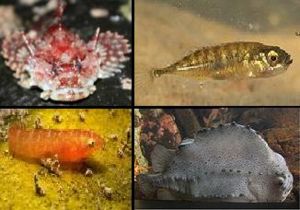Coldwater marine fishes: Difference between revisions
imported>Drew R. Smith No edit summary |
mNo edit summary |
||
| Line 5: | Line 5: | ||
Fish-keepers who live near the seashore may be able to collect species from pools that are isolated by receding tides. If these species outgrow the aquarium, they can easily be returned to the shore. The selection of species described in this section does not represent all temperate coastal regions but is offered as an indication of the variety of species that can be collected by the fish-keeper. Generally speaking, it is likely that coldwater fishes will be rather subdues in color compared with their tropical relatives. A mottled brown coloration is generally the norm. | Fish-keepers who live near the seashore may be able to collect species from pools that are isolated by receding tides. If these species outgrow the aquarium, they can easily be returned to the shore. The selection of species described in this section does not represent all temperate coastal regions but is offered as an indication of the variety of species that can be collected by the fish-keeper. Generally speaking, it is likely that coldwater fishes will be rather subdues in color compared with their tropical relatives. A mottled brown coloration is generally the norm. | ||
Most coldwater marine fishes depend on rocky retreats, so these should be provided in the aquarium. A fine, deep substrate will enable burrowing fishes, like the wrasse, to feel secure. As with tropical aquariums, you can add invertebrates for interest: sea anemones, shrimps, starfish, and small crabs can be included to enliven a coldwater marine scene. Native marine fishes can be kept fairly cheaply in a medium to large tank. Coldwater marine aquariums must be checked for overheating during the summer. | Most coldwater marine fishes depend on rocky retreats, so these should be provided in the aquarium. A fine, deep substrate will enable burrowing fishes, like the wrasse, to feel secure. As with tropical aquariums, you can add invertebrates for interest: sea anemones, shrimps, starfish, and small crabs can be included to enliven a coldwater marine scene. Native marine fishes can be kept fairly cheaply in a medium to large tank. Coldwater marine aquariums must be checked for overheating during the summer.[[Category:Suggestion Bot Tag]] | ||
Latest revision as of 11:00, 30 July 2024
Fish-keepers who live near the seashore may be able to collect species from pools that are isolated by receding tides. If these species outgrow the aquarium, they can easily be returned to the shore. The selection of species described in this section does not represent all temperate coastal regions but is offered as an indication of the variety of species that can be collected by the fish-keeper. Generally speaking, it is likely that coldwater fishes will be rather subdues in color compared with their tropical relatives. A mottled brown coloration is generally the norm.
Most coldwater marine fishes depend on rocky retreats, so these should be provided in the aquarium. A fine, deep substrate will enable burrowing fishes, like the wrasse, to feel secure. As with tropical aquariums, you can add invertebrates for interest: sea anemones, shrimps, starfish, and small crabs can be included to enliven a coldwater marine scene. Native marine fishes can be kept fairly cheaply in a medium to large tank. Coldwater marine aquariums must be checked for overheating during the summer.
